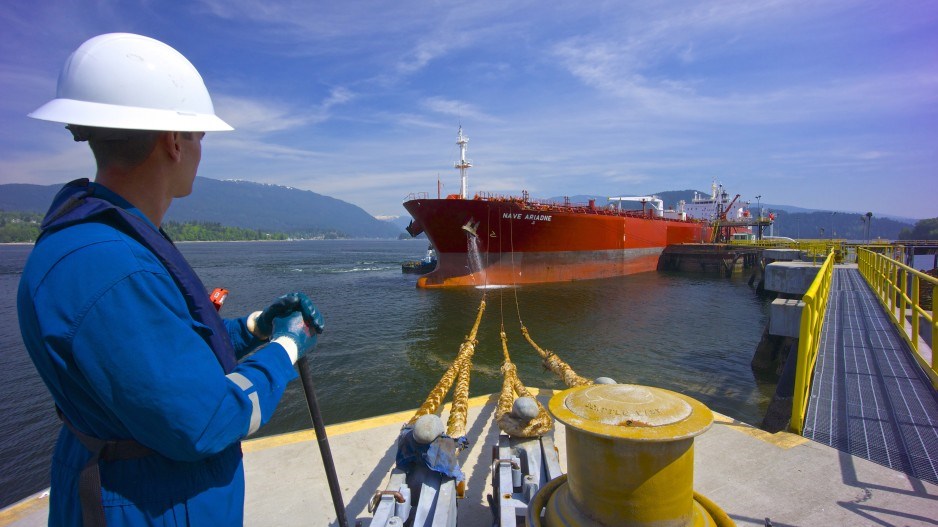A new publicly traded company created to build the $7.4 billion Trans Mountain pipeline expansion debuted on the Toronto Stock Exchange last week, one day after the BC NDP and BC Green Party announced a minority government alliance with the stated goal of killing the project.
Kinder Morgan Canada Ltd. (TSX:KML), the Kinder Morgan Inc. (NYSE:KMI) Canadian subsidiary that began trading on the TSX on May 30, missed its debut target of $17 per share by about eight dimes.
But the bottom line is that investors placed a $1.7 billion confidence bet on Kinder Morgan Canada.
“Kinder Morgan Canada, whether Trans Mountain expansion goes ahead or not, has value,” said Dirk Lever, head of research, energy and infrastructure for AltaCorp Capital Inc. “It’s a valuable business.
“Those people that were looking at the IPO, we don’t know how much value, if any, they gave to the expansion, but they certainly could give full value to the other underlying assets that were operating for years.”
An even more telling market reaction to the political uncertainty that has settled over B.C. than the KML IPO was the share price drop of oil and gas companies invested in B.C.’s Montney shale formation.
Companies like Crew Energy Inc. (TSX:CR), Painted Pony Energy Ltd. (TSX:PONY) and Encana Corp. (TSX:ECA) all saw share price drops of 5% to 6% on May 25 – when the final results of the B.C. election were known – and again on May 30, the day after the Greens and NDP announced their plan to install an NDP minority government.
Kinder Morgan originally planned to price KML shares at between $19 and $23, but then lowered it to $17, possibly as a result of the political uncertainty developing in B.C.
The shares ended up trading in the $16.20 range – a reflection, perhaps, of some investor reticence, but by no means an outright repudiation of the project.
Kinder Morgan was under the gun to make a final investment decision (FID) by the end of May, because its agreement with 13 shippers that have allocations for new capacity on the expanded pipeline was contingent upon that FID timetable.
Even without the expansion, Lever said, Kinder Morgan Canada has good revenue-generating assets and no debt.
Its assets include the existing Trans Mountain pipeline, a pipeline that supplies jet fuel to Vancouver International Airport and a North Shore sulphur terminal.
“Kinder Morgan Canada is an entity now that has no debt,” Lever said. “If the pipeline gets built, it has capacity to borrow money and fund it.”
Kinder Morgan reiterated its plan to begin construction in September, despite the hostility it now faces from a minority NDP government.
“I’m quite confident that it’s very well positioned to be successful in the time frames that are put forward,” said Tim McMillan, CEO of the Canadian Association of Petroleum Producers.
The project has federal and provincial environmental certificates but still requires permits from the provincial government.
It also faces 19 court challenges from First Nations and environmental groups.
On May 29, in announcing a four-year agreement between the Green party and the NDP to establish a minority NDP government, BC Green Party Leader Andrew Weaver said the NDP’s opposition to the project was one of the considerations in his party’s decision to align with the NDP.
In response to the NDP-Green alliance, Prime Minister Justin Trudeau last week restated that the project is deemed to be in the national interest and has his government’s support.
Pipelines are a federal jurisdiction. As such, even a provincial government that is hostile to a federally mandated project is obliged to issue an environmental certificate, said Robin Junger, an expert in aboriginal law for McMillan LLP and former head of the B.C. Environmental Assessment Office.
“From a constitutional law perspective, I think it’s clear that the province can’t stop it,” Junger said. “The law’s pretty clear on that.”
But Horgan and Weaver have vowed to “employ every tool available” to stop the pipeline’s expansion. The project still needs permits for things like road access and tree removal. Issuing those permits is the responsibility of civil servants, not elected politicians, Junger said.
“It would be inappropriate for a politician to tell a statutory decision-maker what decision to make,” Junger said.
As one of the five conditions for supporting the project, Kinder Morgan agreed to a revenue-sharing agreement that would give B.C. $25 million to $50 million annually. Whether that agreement will stand with a provincial government that is now committed to stopping the project remains to be seen. The funding was contingent on the provincial government supporting the project. Under an NDP minority government, the company will no longer have that support.
“I suspect that revenue-sharing deal with Kinder Morgan is the least of the alliance’s concerns at the moment,” said George Hoberg, a professor at the Liu Institute for Global Issues at the University of British Columbia. “There are much bigger political and financial stakes for the province, if the B.C. government reverses its position and withdraws support for Trans Mountain.
“The B.C. government is probably not in a legal position to stop the pipeline over the long run. But it can, through jurisdiction it does control, delay the pipeline and create additional uncertainty for investors.”
The biggest impact of a Green-backed NDP government for the fossil fuel sector might not be on the Trans Mountain pipeline expansion, but on multibillion-dollar liquefied natural gas projects, like Petronas’ Pacific NorthWest LNG proposal for Prince Rupert.
That project’s FID has been deferred twice, and many energy analysts have predicted that no major LNG project is likely to get an FID before 2018. But if Petronas were planning an FID this year or next, it might now push that decision back even further.
“They’re going to wait and see,” Lever said.




